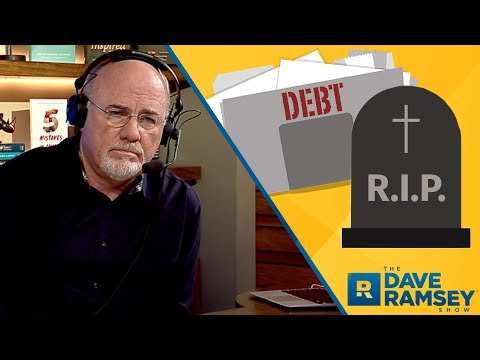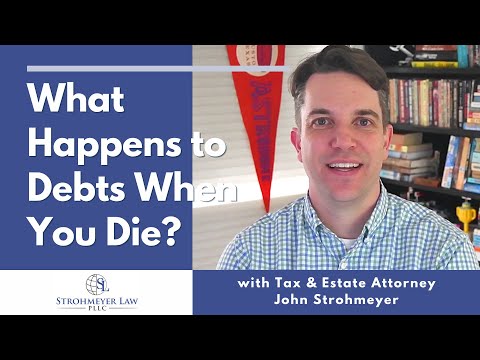The Inevitable Reality: What Happens to Your Debt When You Die?
Death is the one certainty in life, and with it comes the need for financial planning – not only for the golden years but also for what comes afterward. It’s a widespread belief that your debts perish with you, but hang on a minute, that’s not quite true! Each time you borrow—be it mortgages, credit cards, or loans—you’re wrapping a financial thread around your estate that doesn’t just unravel when you take your last breath. So, let’s dive into the nitty-gritty of what happens to your debt when you die and why knowing this can prevent a world of strain for those you leave behind.

1. Estate Settlement: The First Stop for Your Debts
Alright, what happens when you’ve moved on to greener pastures? The blunt truth is your estate is on the hook for your debts. First things first, before your cherished ones see a dime, creditors come knocking to claim their share. Let’s borrow a page from the lives of the celebs—like good olBarry Corbin might act out in a movie role—think of Michael Jackson and Prince. Both had assets that’d make your eyes pop, yet their debts made for a right tangled mess. We’re talking about a circus of legal proceedings where every penny you owned gets scrutinized.
Now, get this: it’s not just about the cash you’ve left behind. Real estate, like those triple Wides, can be lumped into the pot to pay off your mortgage or debts before your kin gets their share. As much as the legacy would have been a palace, your castle might need to be auctioned off to settle the score.

| Type of Debt | What Happens Upon Death? | Exceptions or Notes |
| Secured Debt | The asset may be sold to pay off the debt. | If the heir wants to retain the asset (e.g., a house or car), they must keep making payments on the debt. |
| Unsecured Debt | Paid off by the estate. | If the estate lacks funds, the debt may not get paid. Unsecured debt doesn’t typically pass to relatives. |
| Credit Card Debt | Paid by the estate; not passed to relatives. | Joint account holders may be responsible. An authorized user is not responsible for the debt. |
| Personal Loans | Estate is responsible. | Co-signers are liable for the debt. |
| Medical Debt | Settled by the estate. | – |
| Federal Student Loans | Typically discharged. | Parent PLUS loans are discharged upon the borrower’s or student’s death. |
| Mortgage | Handled by the estate. | Co-signers are responsible. If there’s no co-signer, the house may be sold or go to the lender. |
| Auto Loans | Estate may pay or asset repossessed. | Heirs can take over the loan if they want to keep the vehicle. |
| Tax Debt | Must be paid by the estate. | Certain tax debts may be forgiven. |
| Joint Debts | The surviving co-debtor becomes responsible. | – |
| Debts in Community Property States | Surviving spouse may be responsible. | Applies to debts incurred during the marriage. |
2. Co-Signers and Joint Account Holders: Bound to Debt Beyond Death
You might think, “Hey, out of sight, out of debt,” right? Not so fast. For joint account holders or co-signers, the debt dance continues beyond one’s demise. Picture a couple, entwined by love and mortgage documents. If the grim reaper does the Dumb Donald, ushering one partner away, the surviving honey isn’t off the financial hook—far from it. They’re lassoed to that house payment, for better or worse.
It’s more than just a signature on a dotted line; it’s a promise—’til death parts you from your debt, not each other. So, joint debts don’t poof into thin air—they linger, and unfortunately, they’re keen to stick around.

3. Secured Debts vs. Unsecured Debts: A Post-Mortem Battle
Not all IOUs are born equal, especially not when the curtain falls. If we’re talking secured debts (think mortgages, How Does a home equity loan work, or car notes), they’ve got collateral. This means if the estate can’t pony up the payments, the assets tied up as security might just say adios.
But let’s tap into unsecured debts. Stuff without collateral—like credit cards or social weekend loans. These can’t just muscle their way into seizing property. But wait, don’t go thinking it’s all smooth sailing. If the estate’s dry, lenders might just have to wave goodbye to their money.
What’s the big difference, then? Famous lenders like JPMorgan Chase and Sallie Mae have different playbooks depending on the debt type. Secured loans will go after what’s theirs, but unsecured debts get in line and hope for the best—sometimes getting zilch.

4. State Laws and Probate Process: A Geographical Patchwork of Debt Resolution
Now here’s where things turn into a labyrinth—state laws. Where you lived plays good cop, bad cop with your debts when you die. The Empire State might roll out a different welcome mat for creditors than The Lone Star State. This not only spices up the probate process but can leave executors and heirs peeking behind the curtains of legal intricacies. Facing these laws without knowing the lay of the land is like walking a tightrope with your eyes shut.
Say New York has a fancy-pants approach, favoring the deceased’s family over banks. But lo and behold, you hop over to California, and the scene might flip on its head with community property laws. This means that paradise might have a downside if you and your spouse are seen as a single financial entity.

5. Unusual Cases: When Debt Doesn’t Die
Now, hold your horses, because there are outliers. There are times when the rulebook gets tossed out the window, and debt clings like a stubborn sticker. An old family business might be oozing operational debts, and the founder’s departure to the pearly gates doesn’t staunch the flow. Or maybe a life insurance nugget, that pays out directly to cover outstanding loans, is discovered when rummaging through piles of policy paperwork. These tales that break the mold can knock the wind out of unsuspecting inheritors.
The Ripple Effect: How Your Remaining Debt Influences Survivors
Unpaid bills can cast long shadows over those grieving. The emotional whirlwind of losing a loved one is hard enough without a financial storm on the horizon. Let’s paint a real-life scenario—someone inherits a home but is bogged down by a home equity line of credit. They have to juggle their sorrow with the sobering reality of debts knocking at their door.
It’s more than numbers on a spreadsheet; it’s about the somber realities faced by those picking up the pieces. Loved ones may be forced to learn What Is a line Of credit or What Is equity in a house quicker than they expected, bracing for a crash course in estate management amid their heartache.
Conclusion: The Afterlife of Debt – Planning for the Inevitable
As we wrap up this look-see at the aftermath of debt, we gotta tie it back to planning. It’s not just about squaring away your 401(k); it’s about getting the full Monty on your debts. Learn the rules and play them to your favor. Look into debt insurance options or find ways to shelter those you love from a potential financial hurricane after your swan song.
What happens to your debt when you die spans from clear-cut to convoluted, but it’s a truth we can’t just ignore or wish away. Being savvy about it now is akin to handing down a peace of mind inheritance. Leave a legacy that’s felt in hearts, not wallets. So, smarten up, plan ahead, and let the legacy be one of love, not letters from debt collectors.
What Happens to Your Debt When You Die: Trivia That’ll Keep You Up at Night!
Have you ever wondered, “What the heck happens to my debt when I kick the bucket?” Well, hold on to your hats because we’re diving into some jaw-dropping trivia that’s as surprising as those viral Videos of skateboarding dogs and piano-playing cats. Ready? Let’s unravel the mystery of your financial afterlife!
Who Inherits the Debt Spookhouse?
Alright, spooky fact time: When you shuffle off this mortal coil, your debt can be like one of those uninvited ghosts at a party – it doesn’t just vanish into thin air! Nope, it can linger, waiting to spook your unsuspecting relatives. But fear not, because, in most cases, your kin aren’t on the hook for your personal debts unless they co-signed on the dotted line or live in community property states. Phew!
The Home Sweet Home Plot Twist
Imagine you’ve been savvy about How To get a home equity line Of credit, turning your humble abode into a treasure chest. But when you’re pushing up daisies, that treasure map can lead to an unexpected journey for your heirs. They get to decide whether to sell the family castle, take over the payments, or let the lender claim the keys. It’s a real choose-your-own-adventure moment!
The Cryptic Case of Alegandra Gusman
Speaking of afterlife adventures, let’s talk about “alegandra gusman”. Like a plot from a mystery novel, there’s always one enigma that leaves folks scratching their heads. What becomes of the debts of those with a secretive side? In some cases, the deceased might’ve stashed away debts like hidden treasures (or, let’s be honest, skeletons). It’s up to the estate’s sharp-eyed sherlock, aka the executor, to sniff out these cryptic cases and lay them to rest.
Credit Cards: The Zombie Debt Apocalypse
You might think your credit card debt is six feet under with you, but hold up! Sometimes, these pesky bills are the zombies of the financial world. They can come back from the dead, haunting your estate. And if they’re not taken care of by slicing off their head (figuratively speaking), they might try to bite your loved ones’ wallets.
The Great Debt Escape
Now, here’s a silver lining for you – some debts can indeed vanish into the great beyond! Certain loans are protected by insurance policies, meaning they get a celestial pardon when you pass away. This means your next of kin won’t have to sell their soul to settle your debts. It’s like a “get out of jail free” card for the afterlife!
There you have it, folks! Who knew the topic of “what happens to your debt when you die” could be as riveting as binge-watching a brand-new series? But remember, it’s always a good idea to talk to a professional who knows their stuff, to ensure you (and your loved ones) won’t be caught off-guard in the financial hereafter! Keep your money matters spick and span, and the boogeyman of debt won’t dare come knocking.

What debts are forgiven at death?
What debts are forgotten at death?
Well, ain’t that the million-dollar question! When the final curtain call comes around, most personal debts take a bow and exit stage left. They’re typically swept away, unless there’s enough dough in the estate to cover them. Things like unsecured credit card debt usually get a “rest in peace” card, but secured debts like mortgages aren’t off the hook—they stick to the property faster than gum on a hot sidewalk.
Is family responsible for deceased debt?
Is family responsible for deceased debt?
Hold your horses folks, ’cause this one’s a bit of a relief—you’re generally not on the hook for your dearly departed’s debts. The estate coughs up the cash for any outstanding bills. Only if you’ve co-signed on a loan or live in a community property state might you find yourself fishing out your wallet.
Will I inherit my parents debt?
Will I inherit my parents’ debt?
The short answer? Nope, you won’t inherit it directly. Debts typically don’t get passed down like a family heirloom. However, if they left behind an estate, the debts may need to be paid out of it before you get your inheritance.
Am I responsible for my parents debt?
Am I responsible for my parents’ debt?
Unless you’ve signed on the dotted line as a co-signer or you’re in a community property state, you can breathe easy because you aren’t liable for your parents’ debts after they pass away. The estate takes the hit, not you.
Do you inherit someone’s debt?
Do you inherit someone’s debt?
Picture this: you get an inheritance but with a side of debt—talk about a spoiled surprise! Luckily, that’s not usually how the cookie crumbles. Debts don’t transfer to you unless you’re legally tied to them (think cosigner), so you can put those worry beads away.
Is credit card debt forgiven at death?
Is credit card debt forgiven at death?
When someone kicks the bucket, their credit card debt doesn’t automatically follow suit. The estate gets a chance to settle it up first. If there’s not enough in the piggy bank to pay it off, that’s when the credit card companies typically have to eat the loss.
Do I inherit my mom’s debt if she died?
Do I inherit my mom’s debt if she died?
Not directly, no. Mama may have left you her smile, but her debts stay with her estate. If there’s an inheritance, it might be a bit smaller once those debts have been squared away, but her creditors won’t be knocking on your door asking for payment.
Who inherits debt after death?
Who inherits debt after death?
Here’s the skinny: debts are like bad houseguests, they usually don’t leave anything behind when they go. The estate is responsible for settling up, not the heirs. So if you’re an heir, you don’t “inherit” the debts per se—unless you’ve got your own name tied to them, of course.
Who pays a dead person’s debt?
Who pays a dead person’s debt?
When someone bites the dust, it’s not a free-for-all on their wallet. Their estate steps up to the plate to clear the debts. If there are more debts than assets, well, some creditors might just be out of luck. Family members aren’t personal ATMs for these debts, they’re usually protected.
What not to do when someone dies?
What not to do when someone dies?
Oh boy, where to start? Don’t go on a financial signing spree or a deleting frenzy with their paperwork or online accounts. Don’t dish out the property until the will’s been read and the dust has settled. And whatever you do, don’t keep it all to yourself—reach out for legal advice to avoid a hornet’s nest down the line.
What debt is inheritable?
What debt is inheritable?
Truthfully, no debt is directly inheritable—you won’t find it under your pillow like some twisted Tooth Fairy’s gift. But if you’re all tied up legally with somebody else through joint accounts or cosigning, then you might have to face the music and deal with the debt directly.
When a parent dies where does their debt go?
When a parent dies where does their debt go?
It’s not a game of hot potato—when a parent passes away, their debt hangs out in their estate. If there’s enough cash and assets to go around, that’s where the debt gets sorted. If not, it’s a case of “you can’t get blood from a stone,” and the debts might just vanish.
Can creditors go after beneficiaries?
Can creditors go after beneficiaries?
Now don’t get your knickers in a twist—creditors can’t chase beneficiaries for debts that aren’t theirs. The only time they might come a-knocking is if the beneficiary is also a co-signer, or there’s a mix-up with the deceased’s estate assets that needs untangling.
Can creditors go after family members?
Can creditors go after family members?
Generally speaking, n
How do creditors find out about inheritance?
o, creditors can’t just hound family members for payment like a dog on a bone. Unless you’re legally linked to the debt (like having co-signed), or there’s some other specific legal reason, tell those creditors they’re barking up the wrong tree.
What is the only debt that Cannot be forgiven?
How do creditors find out about inheritance?
Well, talk about nosy parkers! Creditors have their ways—like magic, they sniff out inheritances through probate filings and public records. Sometimes, they monitor the deceased’s credit report to spot any activity that might signal an inheritance is up for grabs.
Can creditors go after beneficiaries?
What is the only debt that Cannot be forgiven?
If only all debts could disappear with a magic wand, right? But alas, Uncle Sam’s tax man doesn’t tend to play by those rules. Federal student loans might wave goodbye if you check out, but tax debt? It’s stickier than a caramel candy in summer—it just doesn’t budge.
Can creditors go after family members?
Can creditors go after beneficiaries?
Hold the phone! We’ve been down this road already. Remember, creditors can’t usually chase beneficiaries for a debt that’s not theirs. But, if you got mixed up in the original agreement, that could be a different kettle of fish.
What types of debts can be forgiven?
Can creditors go after family members?
As we said before, creditors playing tag with family members is not likely unless you’re legally on the hook. So, fret not, unless your signature is on the dotted line as a cosigner or something similar, creditors can look, but they can’t touch.



